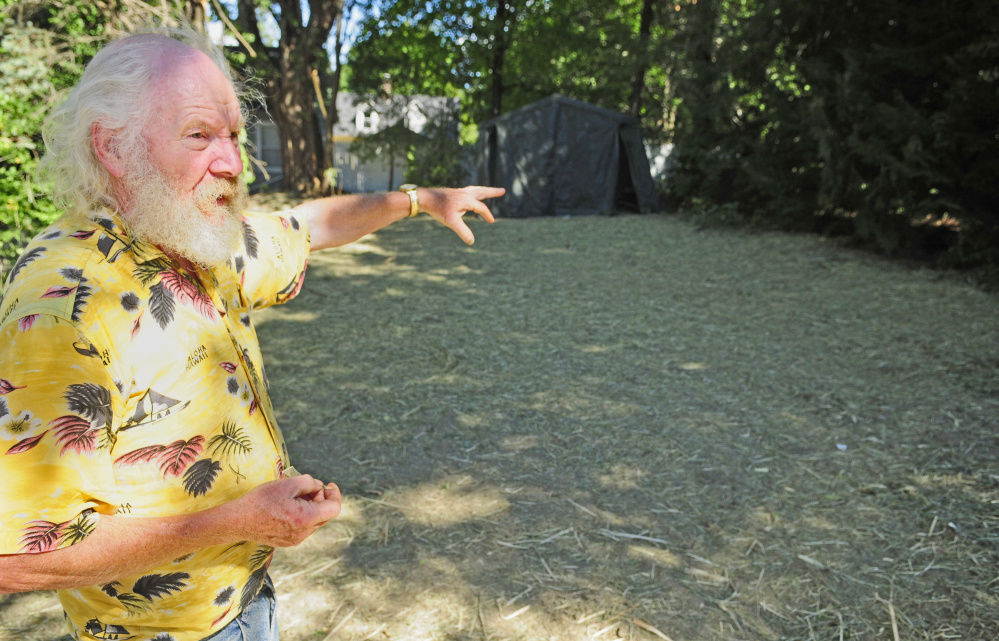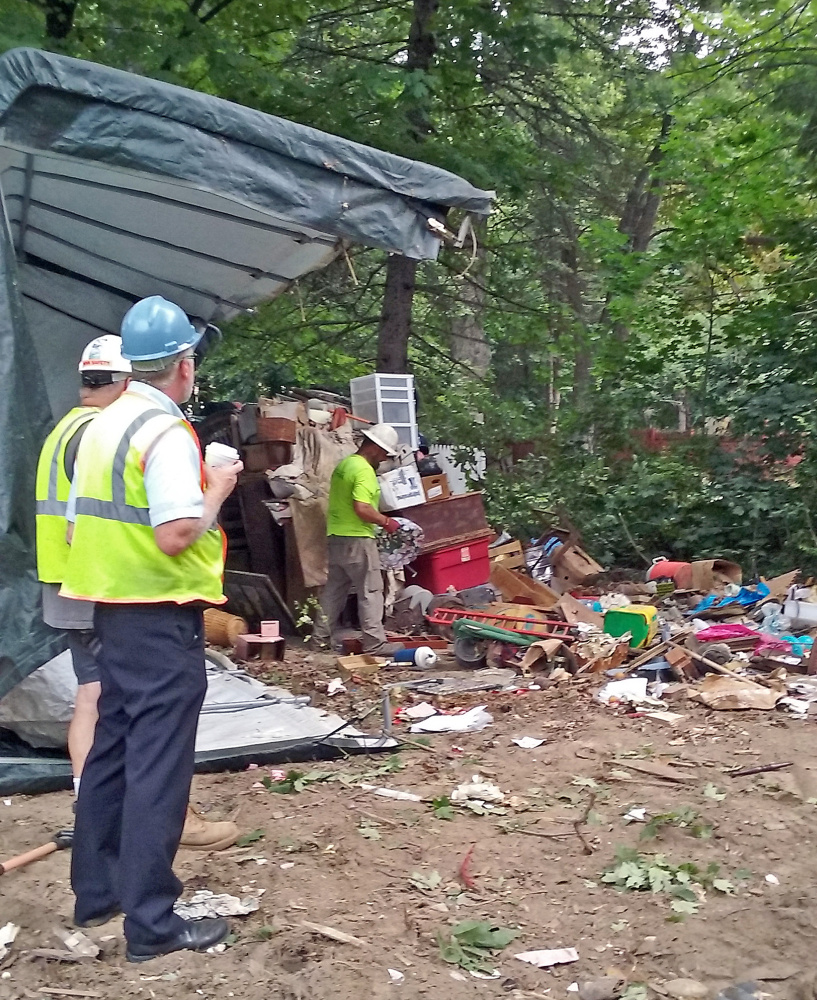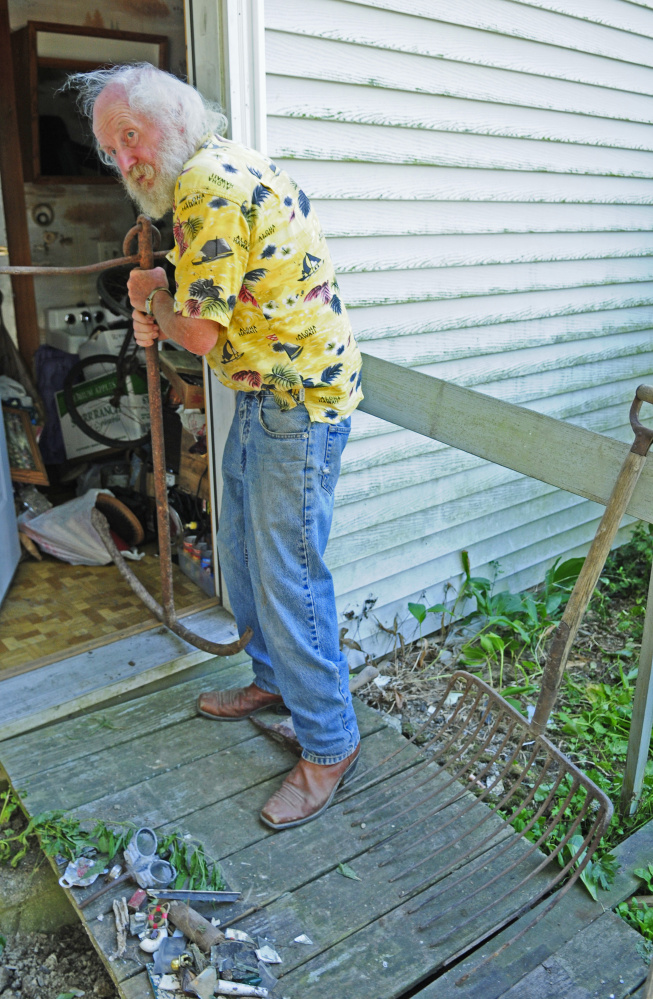AUGUSTA — The city hired a contractor this week to clean up a Cony Street property over the objections of a man who said the items carted off by a contractor included valuable antiques, Civil War collectibles and family heirlooms.
City officials say they got a court order to clean up the yard and outbuildings at 143 Cony St. after dozens of complaints over the past seven years. Contractors had to use an excavator to fill multiple containers full of junk, the city said.
The cleanup process at the home of Rita Elwell and her son Gary Elwell was watched by city police Thursday and Friday morning.
Officials said police went to the property because the owners were upset and uncooperative.
Gary Elwell, 72, said the show of police force was unnecessary and he suspects it was meant to make “a big show” out of the city’s cleanup of the property. He said the whole ordeal was upsetting to his 92-year-old mother, Rita. The contractor removing items from the property destroyed gardens she had tended there for more than 50 years, Elwell said. He said the items scooped up by a large excavator, many of which he said were destroyed in the process, included antiques, some of which were worth thousands of dollars, family heirlooms including his sister’s dollhouse, and personal property.
“All of it had value,” Gary Elwell said. “They said it had no value, but they didn’t take an inventory. They took it away to get rid of the evidence. This is theft. I’m a historian and a writer. I lost my library of rare books, and a lot of my writing.”


What Elwell saw as valuable antiques, heirlooms and collectibles Robert Overton, a city code enforcement officer, saw as junk that had been left outside and unprotected from the elements in violation of state junkyard laws and solid waste rules.
“The unfortunate thing is a lot of the stuff there, at one time, may have had some value, but you don’t take an antique desk and store it in your yard,” Overton said. “Everything out there — and you name it, it was out there — was clearly junk because of the way it was being stored. We ended up removing, I think, four full 20-yard dumpsters of debris.”
Overton said the codes office first sent the Elwells a notice seeking to get the property cleaned up in 2009.
Overton said the problems at the property were caused by Gary Elwell, not his mother, Rita, the owner of the home.
Elwell said he paid $1,000 for one of the books alone, an 1830 collection of Maine literature, and he shuddered to think what the total value of his collection was worth.
He said he had many Civil War-related items in a storage structure on the property and that he’d hoped to start a museum with the items one day.
He said the contractor hired by the city, Augusta-based JARR Management, tipped the storage structure over and removed all of its contents, including Civil War items. One worker, Elwell said, gave him a Confederate grave marker and a few other items of value found in the building, but the rest was hauled off.
COMPLAINT FILED
Over the years, Overton said, the Elwells did make progress after getting letters from the city telling them to clean up the property, enough to avoid the city taking legal action. But in the last two years, he said, the property became significantly worse. He said in the last year, he’s gotten 20 to 30 complaints, most of them anonymous, about that property, more than about any other property in the city. He said the complaints were primarily from passers-by, not abutters to property, and said the Elwells seemed to be well-liked by their neighbors.
In December 2015, the city filed a civil complaint, stating the junk on the property violated Maine laws about junkyards.
After a court hearing that the Elwells did not attend, a district court judge ruled in favor of the city and ordered the Elwells to clean up the property by May 1 of this year.
Overton said the property was not cleaned up. On July 29, in another court proceeding the Elwells did not attend, a judge found them in contempt and ruled it was within the city’s power to clean up the exterior of the property.
“None of the property on the exterior of the building or in the exposed outbuildings has any value and no claims can be made against the city to recover any value of property, with the exception of two antique vehicles located on the property,” Judge Eric Walker wrote in the order.
Stephen Langsdorf, the city attorney, said the Elwells had four-and-a-half months to clean up the site after a judge ruled against them and ordered them to clean up the property, “and they did nothing but make it worse.”
Gary Elwell said he sought a continuation of the July 29 hearing because it was so hot then, with the temperature approaching 100 degrees, that his mother couldn’t attend the hearings. The judge denied a request for continuation of the case.
He said they didn’t get other notifications from the court until it was too late to respond.
He filed an appeal with the Maine Supreme Judicial Court and said he thought that appeal would prevent the city from taking action to remove items from the property.
Langsdorf said it did not, and the city was within its legal rights to go in and clean up the property despite the appeal having been filed.
Overton said most of the items probably went to a disposal facility. He said the contractor was required only to remove the items and dispose of them properly, so the contractor could, if desired, try to sell some of the items. He said much of the material was held aside to be sold as scrap metal.
RECOUP THE COSTS?
Elwell accused the contractor of destroying his mother’s flower and vegetable gardens, removing topsoil and leaving behind lead paint and broken glass on the ground. He said the contamination will make it impossible, or at least costly, to restore the yard as a place where his mother could have a garden.
Overton said any topsoil removal was incidental to the removal of material on the property. He said neighbors indicated that before Gary Elwell moved into the home, it did have well-maintained gardens. But Overton said Friday the only signs of gardens still being there were a few flowers poking up through the old furniture and other junk.
Todd Spofford and Melinda Reynolds-Spofford, of Unity, said they witnessed the city’s action on the property Thursday and said they think the city went too far. Melinda Reynolds-Spofford is Gary Elwell’s cousin.
“I’m not saying the yard didn’t need to be cleaned up, but this was just wanton destruction,” Todd Spofford said. “That’s destroying history, which, to me, is wrong. There was probably $150,000 worth of antiques outside the house.”
Melinda Reynolds-Spofford said she was concerned about the well-being of Rita Elwell, because of how upsetting the incident was to her.
Overton said city officials did receive calls from people worried about Rita Elwell’s well-being, but he said it was hard to get help for someone who doesn’t really want it.
A carriage house behind the home was torn down and removed as part of the cleanup.
Overton said the judge approved an addendum to the court order allowing the city to remove outbuildings, which were full of items, and a tree from the property as part of the cleanup. He said the outbuildings were in danger of falling down from being in disrepair and were being held up by the debris inside them.
Elwell, identifying himself as an antiques dealer who sells at shows, said “that is an exquisite lie” and the carriage house, while in need of some repair, had both a good roof and a solid foundation.
Two vehicles, neither of which was able to be driven, also were taken from the property: a 1995 Ford van and a 1959 Ford Galaxie 500. The court order specified the city, if it took the cars away, would deduct their value from the cost of the property cleanup, which Overton said cost the city just under $7,000.
Overton said he contacted two local auto dealers, and both said the value of both vehicles was only their weight as scrap metal. He said the city has not yet learned the value of the cars as scrap metal.
Overton said while most of the material at the site was old furniture, five or six trash cans overflowing with garbage were next to the sidewalk, creating an odor that had people working on the cleanup gagging. He said during the cleanup, many motorists slowed down as they passed and gave workers a “thumbs up,” which he said appeared to be them signaling they were happy to see the property being cleaned up.
The court order allows the city to seek to recoup the costs of the cleanup from the Elwells.
Langsdorf said if the Elwells don’t pay the cleanup cost, the city could put a lien on the property. However, he and Overton said the city would not enforce the lien against the property as long as Rita Elwell is living there.
The city of Hallowell seized Gary Elwell’s his former home, the historic Gov. Joseph Bodwell House, in 2006 for nonpayment of taxes.
Elwell said he is seeking an attorney to handle his appeal, in an effort to be “made whole” for the city of Augusta’s actions in removing items from the Cony Street property.
Keith Edwards — 621-5647
Twitter: @kedwardskj
Copy the Story LinkSend questions/comments to the editors.












Success. Please wait for the page to reload. If the page does not reload within 5 seconds, please refresh the page.
Enter your email and password to access comments.
Hi, to comment on stories you must . This profile is in addition to your subscription and website login.
Already have a commenting profile? .
Invalid username/password.
Please check your email to confirm and complete your registration.
Only subscribers are eligible to post comments. Please subscribe or login first for digital access. Here’s why.
Use the form below to reset your password. When you've submitted your account email, we will send an email with a reset code.